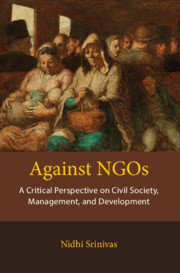Book contents
- Frontmatter
- Dedicaiton
- Contents
- List of Tables and Figure
- List of Abbreviations
- Timeline and Key Events
- Preface and Acknowledgements
- 1 Introduction: Development, Management, and Civil Society from a Critical Perspective
- 2 Colonial Development, Colonial Management
- 3 Modernization Theory, Development, Management
- 4 Dependency Theory and an Alternative Management
- 5 High Management, the Short Reign of Shared Common Sense
- 6 The Washington Consensus and Financialization of Management
- 7 Moving Past the Washington Consensus
- 8 Conclusion: Possibilities of Emancipation
- Glossary of Specialized Phrases and Terms
- References
- Index
1 - Introduction: Development, Management, and Civil Society from a Critical Perspective
Published online by Cambridge University Press: 29 July 2022
- Frontmatter
- Dedicaiton
- Contents
- List of Tables and Figure
- List of Abbreviations
- Timeline and Key Events
- Preface and Acknowledgements
- 1 Introduction: Development, Management, and Civil Society from a Critical Perspective
- 2 Colonial Development, Colonial Management
- 3 Modernization Theory, Development, Management
- 4 Dependency Theory and an Alternative Management
- 5 High Management, the Short Reign of Shared Common Sense
- 6 The Washington Consensus and Financialization of Management
- 7 Moving Past the Washington Consensus
- 8 Conclusion: Possibilities of Emancipation
- Glossary of Specialized Phrases and Terms
- References
- Index
Summary
This is a book about development, management, and civil society, three terms not often used together. Bringing these terms into explicit dialog, within a project of critique, alerts us to their contradictory effects and encourages better recognition of the ways notions of management, development, and civil society interact. This introductory chapter outlines this argument in two parts, as interlinkage and as critique. First, I explain how development, management, and civil society are interlinked themes, and illustrate the theoretical value in exploring their interconnections through two examples. The contemporary example offered here is a growing backlash against non-governmental organizations (NGOs). I ask if such backlash can be considered to be critical. Therefore, second, I define a project of critique and the particular light it sheds on the interconnections of development, management, and civil society.
Specters of development, management, and civil society
The noted, in many ways admirable, Indian writer Arundhati Roy (2012) published an essay in the spring of 2012 called “Capitalism: A Ghost Story.” Outraged by the increased income inequality in India and worldwide, the development policies that privilege wealthy upper classes and disadvantage the poor, and the self-serving agendas of corporate philanthropy, Roy's essay weaves loose threads across a range of topics that point to the contemporary capitalist moment in India; they include Mukesh Ambani's high-rise mansion in Mumbai, political corruption, sale of mineral-rich tribal land to corporations, repression by state-funded paramilitary in central India, consolidation of corporate media and attendant-biased coverage, industrial corridors and people displaced by them, and the Kalpasar Dam which is to enclose a coastal gulf to retain river water.
Roy grounds her wide-ranging examples in a particular aspect of contemporary capitalism—philanthropy. Corporate philanthropy is accused here of many sins: white-washing corporate crimes through targeted funding of arts festivals; funding pressure-groups and lobbies to promote capitalist values (and the United States of America's [US] hegemony); shaping past and current patterns of global governance through the Bretton Woods agreement, the United Nations (UN), and the Trilateral Commission (now “a penta-lateral commission, because it includes members from China and India”) (Roy, 2012: 13); making microcredit a suitable development policy despite its serious flaws; influential awards that “become a gentle arbiter of what kind of activism is ‘acceptable’ and what is not” (Roy, 2012: 13); and creating an industry of human rights for “an atrocity-based analysis in which the larger picture can be blocked out” (Roy, 2012: 20).
- Type
- Chapter
- Information
- Against NGOsA Critical Perspective on Civil Society, Management and Development, pp. 1 - 39Publisher: Cambridge University PressPrint publication year: 2022



